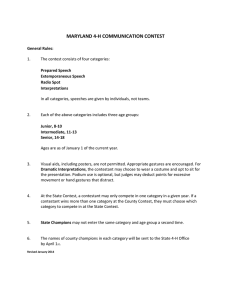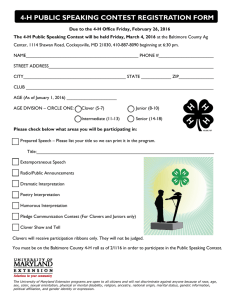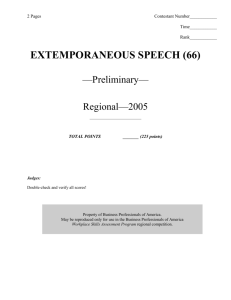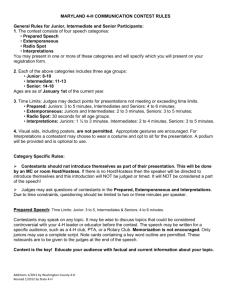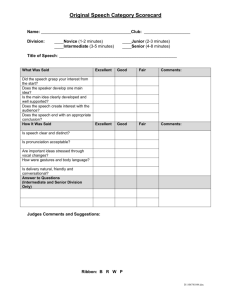Document 14893454
advertisement
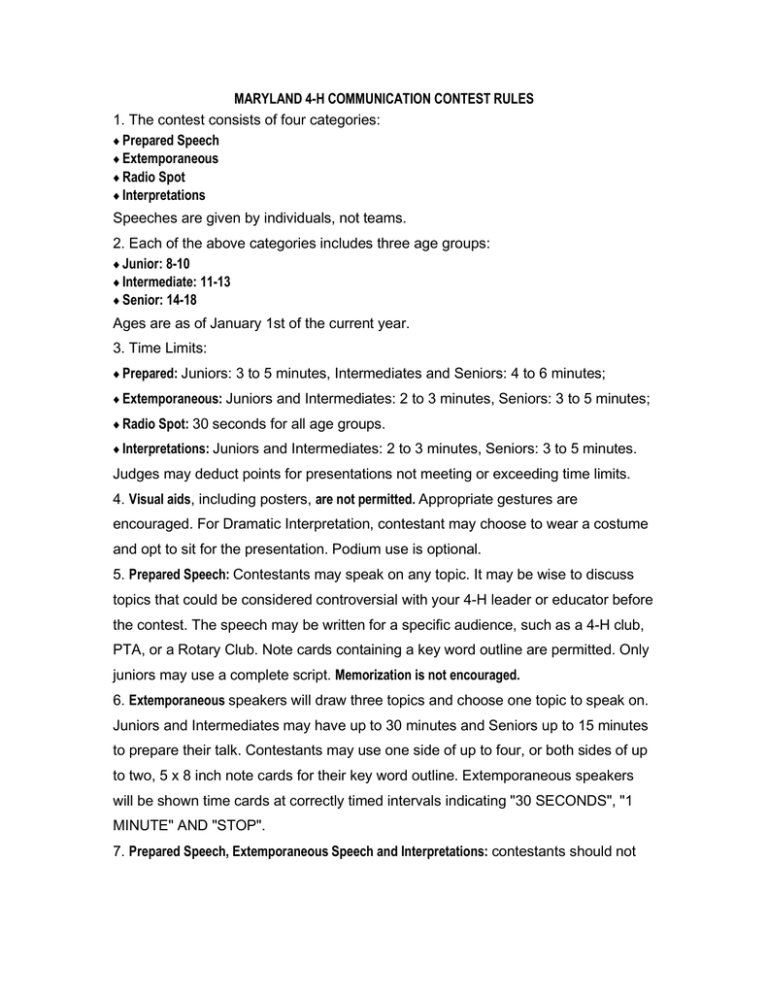
MARYLAND 4-H COMMUNICATION CONTEST RULES 1. The contest consists of four categories: ♦ Prepared Speech ♦ Extemporaneous ♦ Radio Spot ♦ Interpretations Speeches are given by individuals, not teams. 2. Each of the above categories includes three age groups: ♦ Junior: 8-10 ♦ Intermediate: 11-13 ♦ Senior: 14-18 Ages are as of January 1st of the current year. 3. Time Limits: ♦ Prepared: Juniors: 3 to 5 minutes, Intermediates and Seniors: 4 to 6 minutes; ♦ Extemporaneous: ♦ Radio Juniors and Intermediates: 2 to 3 minutes, Seniors: 3 to 5 minutes; Spot: 30 seconds for all age groups. ♦ Interpretations: Juniors and Intermediates: 2 to 3 minutes, Seniors: 3 to 5 minutes. Judges may deduct points for presentations not meeting or exceeding time limits. 4. Visual aids, including posters, are not permitted. Appropriate gestures are encouraged. For Dramatic Interpretation, contestant may choose to wear a costume and opt to sit for the presentation. Podium use is optional. 5. Prepared Speech: Contestants may speak on any topic. It may be wise to discuss topics that could be considered controversial with your 4-H leader or educator before the contest. The speech may be written for a specific audience, such as a 4-H club, PTA, or a Rotary Club. Note cards containing a key word outline are permitted. Only juniors may use a complete script. Memorization is not encouraged. 6. Extemporaneous speakers will draw three topics and choose one topic to speak on. Juniors and Intermediates may have up to 30 minutes and Seniors up to 15 minutes to prepare their talk. Contestants may use one side of up to four, or both sides of up to two, 5 x 8 inch note cards for their key word outline. Extemporaneous speakers will be shown time cards at correctly timed intervals indicating "30 SECONDS", "1 MINUTE" AND "STOP". 7. Prepared Speech, Extemporaneous Speech and Interpretations: contestants should not introduce themselves as part of their presentation. This will be done by an MC or room Host/Hostess. 8. Radio spots should be exactly 30 seconds in length and may include a musical or sound effect introduction and/or background, but may not include a spoken introduction or “tag” by anyone other than the contestant. If music or a sound effect is used, the contestant must provide and operate the sound-making device. The contestant will provide a complete written script (including notations about music/sound effects) to the timekeeper to aid in timing accuracy. Musical/sound effect introductions and endings are considered a part of the radio spot and must not cause the 30 second time limit to be exceeded The spot should relate to 4-H, be original and be created by the contestant. 9. Interpretations: Speaker can speak or interpret in language of their choice. If using language other than spoken English, participant must inform Extension Office before the event to ensure appropriate judges. 10. Judges may ask questions of contestants in the prepared, extemporaneous and interpretations. Due to time constraints, questioning should be limited to two or three minutes per speaker. Questions will not be asked in the radio spot category. 11. At the State Contest, a contestant may only compete in one category. If a contestant wins more than one category at the County Contest, they must choose which category to compete in at the State Contest. 12. The names of county champions in age group in each category will be sent to the State 4-H Office by April 1st. 14. State Champions may not enter the same category and age group a second time. Dramatic, Poetry, and Humorous Interpretations Interpretations are to be memorized oral interpretation or a selection of narrative in language of speaker’s choice. Interpretations consist of three categories: Dramatic Interpretation a. Oral interpretation, memorized by the speaker or a serious selection of narrative or dramatic literature. Monologues are acceptable. b. Mime – use your body to create an interpretation Poetry Interpretation – a memorized oral interpretation by the speaker. Humorous Interpretation – a memorized oral interpretation of a humorous selection by the speaker. Cuttings may be taken from published plays or prose. Rules: 1. Time limits: a. Juniors & Intermediates: 2 to 3 minutes b. Seniors: 3 to 5 minutes 2. Visual aides are not permitted. Appropriate gestures are encouraged. For Dramatic Interpretation, contestant may opt to sit for presentation. Podium use is optional. 3. Contestants are to bring two (2) copies of the script including reference. Language other than spoken English must be translated. 4. Speaker can speak or interpret in language of their choice. If using language other than spoken English, participant must inform Extension Office before the event to ensure appropriate judges. 5. At the State Contest, a contestant may only compete in one category. If a contestant wins more than one category at the County Contest, they must choose which category to compete in at the State Contest. 6. The names of the champions in each of the three age groups of each category will be sent to the State 4-H Office by April 1. State Champions may not enter the same category and age group a second time. HARFORD COUNTY’S ADDITIONAL DIVISIONS TO THE PUBLIC SPEAKING CONTEST Clover Category Open to all Clovers ages 5-7. Clovers will be allowed time for “Show & Tell.” Props welcomed. Juniors – Ages 8-10 Juniors may recite the 4-H Pledge and use appropriate hand motions along with the recitation. Duo Dialogue This category is for teams of two. You may choose something you have written or use “borrowed” material. Please refer to the State Rules on page 3 entitled, “Dramatic, Poetry, and Humorous Interpretations.” Please note rules 5-6 do not apply. These categories are available, however, participants will not be invited to compete at the state level.
